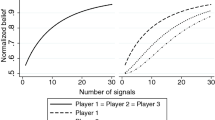Abstract
Individuals make decisions every day. How they come up with estimates to guide their decisions could be a result of a combination of different information sources such as individual beliefs and previous knowledge, random guesses, and social cues. This study aims to sort out individual estimate assessments over multiple times with the main focus on how individuals weigh their own beliefs vs. those of others in forming their future estimates. Using dynamics modeling, we build on data from an experiment conducted by Lorenz et al. [1] where 144 subjects made five estimates for six factual questions in an isolated manner (no interaction allowed between subjects). We model the dynamic mechanisms of changing estimates for two different scenarios: 1) when individuals are not exposed to any information and 2) when they are under social influence.
Access this chapter
Tax calculation will be finalised at checkout
Purchases are for personal use only
Preview
Unable to display preview. Download preview PDF.
Similar content being viewed by others
References
Lorenz, J., et al.: How social influence can undermine the wisdom of crowd effect. Proceedings of the National Academy of Sciences of the United States of America 108(22), 9020–9025 (2011)
Budescu, D.V., Rantilla, A.K.: Confidence in aggregation of expert opinions. Acta Psychologica 104(3), 371–398 (2000)
Soll, J.B., Mannes, A.E.: Judgmental aggregation strategies depend on whether the self is involved. International Journal of Forecasting 27(1), 81–102 (2011)
Rauhut, H., Lorenz, J.: The wisdom of crowds in one mind: How individuals can simulate the knowledge of diverse societies to reach better decisions. Journal of Mathematical Psychology 55(2), 191–197 (2011)
Herzog, S.M., Hertwig, R.: The Wisdom of Many in One Mind: Improving Individual Judgments With Dialectical Bootstrapping. Psychological Science 20(2), 231–237 (2009)
Yaniv, I.: The benefit of additional opinions. Current Directions in Psychological Science 13(2), 75–78 (2004)
Yaniv, I.: Receiving other people’s advice: Influence and benefit. Organizational Behavior and Human Decision Processes 93(1), 1–13 (2004)
Larrick, R.P., Soll, J.B.: Intuitions about combining opinions: Misappreciation of the averaging principle. Management Science 52(1), 111–127 (2006)
Soll, J.B., Larrick, R.P.: Strategies for Revising Judgment: How (and How Well) People Use Others’ Opinions. Journal of Experimental Psychology-Learning Memory and Cognition 35(3), 780–805 (2009)
Wright, G., Rowe, G.: Group-based judgmental forecasting: An integration of extant knowledge and the development of priorities for a new research agenda. International Journal of Forecasting 27(1), 1–13 (2011)
Lee, M.D., Zhang, S., Shi, J.: The wisdom of the crowd playing The Price Is Right. Memory & Cognition 39(5), 914–923 (2011)
Surowiecki, J.: The wisdom of crowds: why the many are smarter than the few and how collective wisdom shapes business, economies, societies, and nations, 1st edn., vol. xxi, p. 296. Doubleday, New York (2004)
Bonaccio, S., Dalal, R.S.: Advice taking and decision-making: An integrative literature review, and implications for the organizational sciences. Organizational Behavior and Human Decision Processes 101(2), 127–151 (2006)
Hourihan, K.L., Benjamin, A.S.: Smaller Is Better (When Sampling From the Crowd Within): Low Memory-Span Individuals Benefit More From Multiple Opportunities for Estimation. Journal of Experimental Psychology-Learning Memory and Cognition 36(4), 1068–1074 (2010)
Hogarth, R.M.: Note on Aggregating Opinions. Organizational Behavior and Human Performance 21(1), 40–46 (1978)
Gino, F., Moore, D.A.: Effects of task difficulty on use of advice. Journal of Behavioral Decision Making 20(1), 21–35 (2007)
Krueger, J.I.: Return of the ego–Self-referent information as a filter for social prediction: Comment on Karniol (2003)
Yaniv, I., Kleinberger, E.: Advice taking in decision making: Egocentric discounting and reputation formation. Organizational Behavior and Human Decision Processes 83(2), 260–281 (2000)
Harvey, N., Harries, C.: Effects of judges’ forecasting on their later combination of forecasts for the same outcomes. International Journal of Forecasting 20(3), 391–409 (2004)
Yaniv, I., Milyavsky, M.: Using advice from multiple sources to revise and improve judgments. Organizational Behavior and Human Decision Processes 103(1), 104–120 (2007)
Mannes, A.E.: Are We Wise About the Wisdom of Crowds? The Use of Group Judgments in Belief Revision. Management Science 55(8), 1267–1279 (2009)
Reed-Tsochas, F., Onnela, J.P.: Spontaneous emergence of social influence in online systems. Proceedings of the National Academy of Sciences of the United States of America 107(43), 18375–18380 (2010)
Author information
Authors and Affiliations
Editor information
Editors and Affiliations
Rights and permissions
Copyright information
© 2014 Springer International Publishing Switzerland
About this paper
Cite this paper
Jalali, M.S. (2014). How Individuals Weigh Their Previous Estimates to Make a New Estimate in the Presence or Absence of Social Influence. In: Kennedy, W.G., Agarwal, N., Yang, S.J. (eds) Social Computing, Behavioral-Cultural Modeling and Prediction. SBP 2014. Lecture Notes in Computer Science, vol 8393. Springer, Cham. https://doi.org/10.1007/978-3-319-05579-4_9
Download citation
DOI: https://doi.org/10.1007/978-3-319-05579-4_9
Publisher Name: Springer, Cham
Print ISBN: 978-3-319-05578-7
Online ISBN: 978-3-319-05579-4
eBook Packages: Computer ScienceComputer Science (R0)




